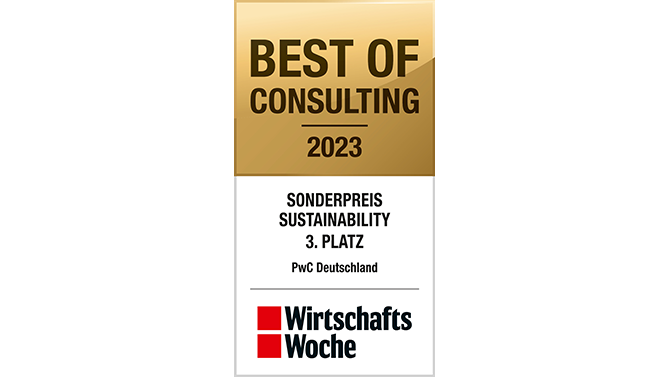The challenge
Climate change has been having financial impacts on companies for some time now. The reason is simple: decarbonisation of the economy is gradually accelerating, and there are certain risks involved in this transition, as well as the increasing physical risks from global warming itself. Decarbonisation also presents a whole host of opportunities for early movers and for providers of solutions. But most companies have hardly got around to systematically analysing the risks resulting from climate change – let alone the opportunities.
This was how things were back in 2021 for GEA, an engineering company looking to develop a market-leading approach to financially assessing climate impacts throughout its value chain. At the same time, the company needed to meet growing demands from the capital markets, ratings bodies and rankings agencies, as well as complying with new reporting regulations such as those under the Corporate Sustainability Reporting Directive (CSRD). A particular objective for the company was to use current best practice under consideration of the recommendations by the Task Force on Climate-Related Financial Disclosures (TCFD).
Our approach
Using an iterative approach to embed climate issues cross-functionally in the company, we analysed the GEA Group’s climate-related risks and opportunities step by step, integrated them into the enterprise’s risk and opportunity management programmes and developed an external reporting system. This work was undertaken between December 2021 and December 2022 and comprised the following stages:
- Gap analysis of external demands: Our experts carried out interviews and analyses across the company’s departments to assess how well external demands and requirements were being met.
- Identifying relevant opportunities and risks: Based on the financial materiality of all areas of the company, our team conducted a climate scenario-specific evaluation for procurement, company sites and key customer markets, using heatmaps to illustrate the results.
- Evaluating the financial impacts of strategic scenarios: Our consultants ran a quantitative scenario analysis using PwC’s Climate Excellence tool, evaluating both the likelihood and the significance of financial impacts.
- Integration into risk management: The team drew up a roadmap for adjusting GEA’s risk and opportunity management programmes.
- Reporting: The final stage was to help GEA with setting up a reporting programme to meet external requirements.
“Sustainability is the first pillar of our corporate strategy. If we’re going to continue to make the right decisions on sustainability, we need a system to identify climate-related opportunities and risks at an early stage. And we now have one, thanks to the fantastic support we got from PwC.”
Nadine Sterley,Chief Sustainability Officer, GEA GroupOur team had to overcome the following challenges at GEA:
Questions?
Contact our experts.
GEA’s added value
Developed over 13 months of close collaboration in 2021 and 2022, our solutions for GEA are now creating real value:
More resilient business model
Our team identified specific starting points to minimise climate risks and maximise opportunities. The basis built GEA’s decarbonisation strategy, making changes to buildings on company sites, and increasing the company’s market share in the field of decarbonisation solutions.
Enabling the company to continue independently
We raised awareness among relevant internal stakeholders and integrated climate impacts into the GEA’s regular risk and opportunity management programmes, laying the foundations for profound monitoring and management in the future.
Improved valuation by investors, ratings and rankings
The results of this project built on the company’s net zero strategy, jointly developed by GEA and PwC in 2020/21. GEA’s latest climate project confirms the Group’s aims of being a sustainability leader in the engineering sector, strengthening its position in ratings and rankings and improving the company’s performance for investors. At the same time, GEA is now also ready for the growing reporting requirements around climate-related risks and opportunities.

“Climate change is affecting the way of doing business. All companies need to consider the risks and opportunities resulting from these changes in their strategies.”
Gunther Dütsch,Partner, Sustainability Services at PwC Germany
Best of Consulting
Our work on this project at GEA was recognised in 2023, when we won third prize in the special sustainability category of WirtschaftWoche’s “Best of Consulting” awards.
Contact our experts
We are a community of solvers combining human ingenuity, experience and technological innovation to achieve sustainable results and create trust.
Want to effectively identify and manage climate-related risks and opportunities?
Our sustainability experts are here to help you identify the financial impacts of climate change at an early stage, proactively set a suitable course for your company and effectively boost the resilience of your business model. At the same time, we’ll also help you to comply with external reporting requirements around climate risk.








